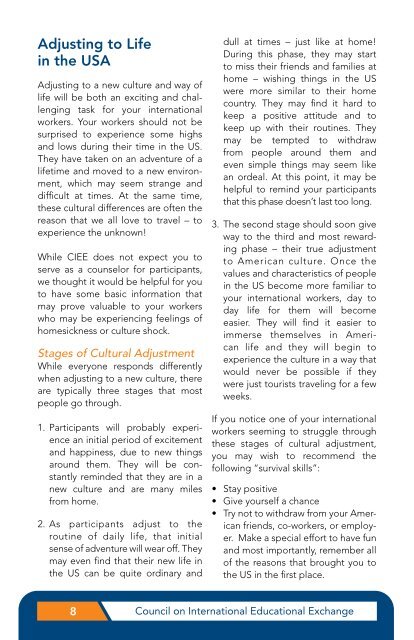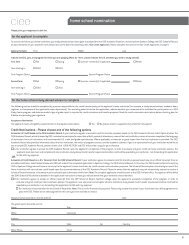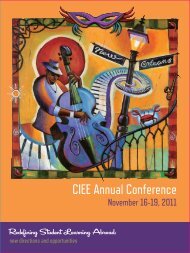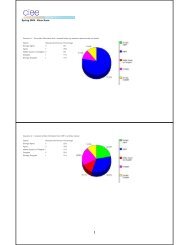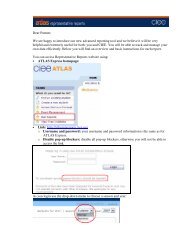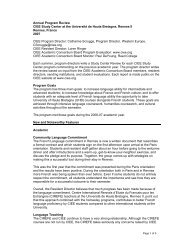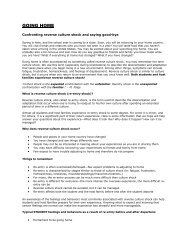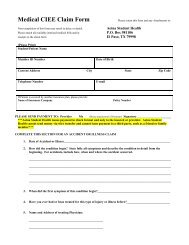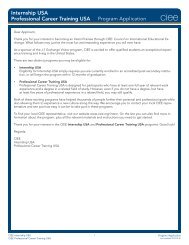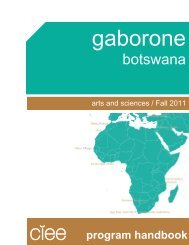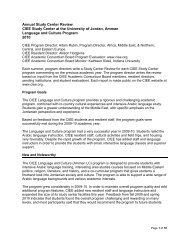employer handbook - Council on International Educational Exchange
employer handbook - Council on International Educational Exchange
employer handbook - Council on International Educational Exchange
You also want an ePaper? Increase the reach of your titles
YUMPU automatically turns print PDFs into web optimized ePapers that Google loves.
Adjusting to Life<br />
in the USA<br />
Adjusting to a new culture and way of<br />
life will be both an exciting and challenging<br />
task for your internati<strong>on</strong>al<br />
workers. Your workers should not be<br />
surprised to experience some highs<br />
and lows during their time in the US.<br />
They have taken <strong>on</strong> an adventure of a<br />
lifetime and moved to a new envir<strong>on</strong>ment,<br />
which may seem strange and<br />
difficult at times. At the same time,<br />
these cultural differences are often the<br />
reas<strong>on</strong> that we all love to travel – to<br />
experience the unknown!<br />
While CIEE does not expect you to<br />
serve as a counselor for participants,<br />
we thought it would be helpful for you<br />
to have some basic informati<strong>on</strong> that<br />
may prove valuable to your workers<br />
who may be experiencing feelings of<br />
homesickness or culture shock.<br />
Stages of Cultural Adjustment<br />
While every<strong>on</strong>e resp<strong>on</strong>ds differently<br />
when adjusting to a new culture, there<br />
are typically three stages that most<br />
people go through.<br />
1. Participants will probably experience<br />
an initial period of excitement<br />
and happiness, due to new things<br />
around them. They will be c<strong>on</strong>stantly<br />
reminded that they are in a<br />
new culture and are many miles<br />
from home.<br />
2. As participants adjust to the<br />
routine of daily life, that initial<br />
sense of adventure will wear off. They<br />
may even find that their new life in<br />
the US can be quite ordinary and<br />
dull at times – just like at home!<br />
During this phase, they may start<br />
to miss their friends and families at<br />
home – wishing things in the US<br />
were more similar to their home<br />
country. They may find it hard to<br />
keep a positive attitude and to<br />
keep up with their routines. They<br />
may be tempted to withdraw<br />
from people around them and<br />
even simple things may seem like<br />
an ordeal. At this point, it may be<br />
helpful to remind your participants<br />
that this phase doesn’t last too l<strong>on</strong>g.<br />
3. The sec<strong>on</strong>d stage should so<strong>on</strong> give<br />
way to the third and most rewarding<br />
phase – their true adjustment<br />
to American culture. Once the<br />
values and characteristics of people<br />
in the US become more familiar to<br />
your internati<strong>on</strong>al workers, day to<br />
day life for them will become<br />
easier. They will find it easier to<br />
immerse themselves in American<br />
life and they will begin to<br />
experience the culture in a way that<br />
would never be possible if they<br />
were just tourists traveling for a few<br />
weeks.<br />
If you notice <strong>on</strong>e of your internati<strong>on</strong>al<br />
workers seeming to struggle through<br />
these stages of cultural adjustment,<br />
you may wish to recommend the<br />
following “survival skills”:<br />
• Stay positive<br />
• Give yourself a chance<br />
• Try not to withdraw from your American<br />
friends, co-workers, or <str<strong>on</strong>g>employer</str<strong>on</strong>g>.<br />
Make a special effort to have fun<br />
and most importantly, remember all<br />
of the reas<strong>on</strong>s that brought you to<br />
the US in the first place.<br />
• Be open and friendly, and people<br />
will resp<strong>on</strong>d likewise<br />
• Maintain a sense of humor and an<br />
open mind. Keep in mind that even<br />
the most extraordinary experience<br />
will make an entertaining story<br />
at home that is sure to make your<br />
family, friends, and even you, laugh<br />
someday!<br />
For some participants, these basic tips<br />
may not be adequate to help them<br />
get through this adjustment period.<br />
If you have any more serious c<strong>on</strong>cerns<br />
about the welfare of your workers,<br />
please direct these participants<br />
to c<strong>on</strong>tact CIEE’s Customer Service<br />
Center at 888-COUNCIL (888-268-6245)<br />
or via email at c<strong>on</strong>tact@ciee.org. Also,<br />
please do not hesitate to c<strong>on</strong>tact us<br />
yourself if you feel that <strong>on</strong>e of your<br />
workers needs our assistance.<br />
Account Support for CIEE<br />
Employers<br />
If you have hired your students using<br />
a CIEE service (CIEE Road Show, CIEE<br />
Recruit or CIEE Direct), we offer you an<br />
<strong>on</strong>line support service. Please follow<br />
this link to report any n<strong>on</strong>-emergency<br />
situati<strong>on</strong>s: http://www.ciee.org/hire/<br />
support/<br />
Procedures for Changing<br />
Employers/Hiring<br />
Participants for a<br />
Sec<strong>on</strong>d Job<br />
Participants must receive permissi<strong>on</strong><br />
from CIEE, in the form of a letter, before<br />
changing <str<strong>on</strong>g>employer</str<strong>on</strong>g>s. This policy<br />
helps us better regulate where each<br />
participant is working, as well as pro-<br />
viding more assurance to <str<strong>on</strong>g>employer</str<strong>on</strong>g>s<br />
that participants will meet their agreed<br />
up<strong>on</strong> employment obligati<strong>on</strong>s.<br />
If you are looking to hire a student<br />
who is changing <str<strong>on</strong>g>employer</str<strong>on</strong>g>s or seeking<br />
a sec<strong>on</strong>d job, direct them to c<strong>on</strong>tact<br />
CIEE to secure permissi<strong>on</strong> authorizing<br />
them to work for you as a sec<strong>on</strong>d<br />
<str<strong>on</strong>g>employer</str<strong>on</strong>g>. This process will protect the<br />
interest of the original <str<strong>on</strong>g>employer</str<strong>on</strong>g> and<br />
make sure that both <str<strong>on</strong>g>employer</str<strong>on</strong>g>s, the<br />
participant, and CIEE are in agreement<br />
with the new situati<strong>on</strong>. The original<br />
<str<strong>on</strong>g>employer</str<strong>on</strong>g>’s (or CIEE’s) name will remain<br />
<strong>on</strong> the DS-2019 form.<br />
If a student leaves your company<br />
to look for another job without your<br />
c<strong>on</strong>sent, please c<strong>on</strong>tact CIEE as so<strong>on</strong><br />
as possible at 888-COUNCIL (888-268-<br />
6245) and we will address the situati<strong>on</strong>.<br />
Staying in Touch with<br />
Your Workers<br />
One of the most rewarding aspects of<br />
hiring internati<strong>on</strong>al workers is the opportunity<br />
to build a worldwide network<br />
of acquaintances. With email, keeping<br />
in touch with people in all corners of<br />
the world is easy to do. Be sure to exchange<br />
email addresses and even teleph<strong>on</strong>e<br />
numbers with your internati<strong>on</strong>al<br />
workers as their time with you ends.<br />
You will be amazed at how enjoyable<br />
it can be to keep track of how your<br />
workers’ lives unfold. And, you may<br />
even end up with a place to stay the<br />
next time you’re in Bangkok, Warsaw,<br />
or Lima!<br />
8 <str<strong>on</strong>g>Council</str<strong>on</strong>g> <strong>on</strong> Internati<strong>on</strong>al Educati<strong>on</strong>al <strong>Exchange</strong> Work & Travel USA<br />
9


